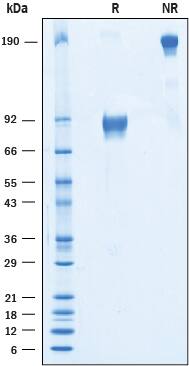Recombinant Human IGSF4C/SynCAM4 Fc Chimera Protein, CF
R&D Systems, part of Bio-Techne | Catalog # 9905-S4

Key Product Details
Source
Accession #
Structure / Form
Conjugate
Applications
Product Specifications
Source
| Human IGSF4C (Gln25-Tyr323) Accession # Q8NFZ8 |
IEGRMD | Human IgG1 (Pro100-Lys330) |
| N-terminus | C-terminus |
Purity
Endotoxin Level
N-terminal Sequence Analysis
Predicted Molecular Mass
SDS-PAGE
Activity
Recombinant Human IGSF4C/SynCAM4 Fc Chimera, immobilized at 0.5-1 μg/mL on a 96-well plate, is able to significantly enhance neurite outgrowth.
Scientific Data Images for Recombinant Human IGSF4C/SynCAM4 Fc Chimera Protein, CF
Recombinant Human IGSF4C/SynCAM4 Fc Chimera Protein Bioactivity
Recombinant Human IGSF4C/SynCAM4 Fc Chimera (Catalog # 9905-S4) Induces Cortical Neurite Outgrowth. A) Untreated E16-18 embryonic rat cortical neurons. B) Neurite outgrowth in E16-18 embryonic rat cortical neurons treated with 0.5 μg/mL of Recombinant Human IGSF4C/SynCAM4 Fc Chimera.Recombinant Human IGSF4C/SynCAM4 Fc Chimera Protein SDS-PAGE
2 μg/lane of Recombinant Human IGSF4C was resolved with SDS-PAGE under reducing (R) and non-reducing (NR) conditions and visualized by Coomassie® Blue staining, showing bands at 74-97 kDa and 150-200 kDa, respectively.Formulation, Preparation and Storage
9905-S4
| Formulation | Lyophilized from a 0.2 μm filtered solution in PBS. |
| Reconstitution |
Reconstitute at 1 mg/mL in PBS.
|
| Shipping | The product is shipped at ambient temperature. Upon receipt, store it immediately at the temperature recommended below. |
| Stability & Storage |
|
Background: IGSF4C/SynCAM4
IGSF4C is an immunoglobulin superfamily member that is also known as Nectin-like protein 4 (Necl-4), synaptic cell adhesion molecule 4 (SynCAM4), or tumor suppressor in lung cancer-like 2 (TSLL-2) (1, 2). The four IGSF4 proteins, designated A, B, C and D, are type I transmembrane glycoproteins expressed mainly in neurons, but also in lung, kidney, bladder, prostate and testis (1-5). Their extracellular domains (ECD) share 35-50% amino acid (aa) identity and each contain one V-type Ig-like and two C2-type Ig-like domains. These domains are responsible for Ca++-independent homophilic and heterophilic interactions. The 388 aa human IGSF4C contains a 20 aa signal sequence, a 304 aa ECD that shares 98-99% amino acid identity with mouse, rat, canine and bovine IGSF4C, a 21 aa transmembrane sequence, and a 43 aa cytoplasmic domain. The apparent size of mouse or human IGSF4C may be variably reported as 48-67 kDa, probably due to differences in glycosylation (2, 5, 8). In the peripheral nervous system, IGSF4C is expressed on Schwann cells, and its internodal interaction with IGSF4A (Necl-1, SynCAM-3) on axons is critical for adhesion and myelination (6-8). In the brain, all IGSF4 family members are expressed at high levels concurrent with synapse formation (4). In the cerebellum, IGSF4C is expressed on Purkinje cells, with complementary expression of IGSF4 on granule cells (4). Heterophilic interaction with IGSF4D (Necl-3, SynCAM2) has also been identified, but homophilic interaction is unlikely (4, 6). IGSF4C is also proposed as a tumor suppressor that is downregulated in many prostate cancers and gliomas (1, 5).
References
- Fukuhara, H. et al. (2001) Oncogene 20:5401.
- Biederer, T. et al. (2006) Genomics 87:139.
- Takai, Y. et al. (2008) Nat. Rev. Mol. Cell Biol. 9:603.
- Thomas, L. A. et al. (2008) J. Comp. Neurol. 510:47.
- Williams, Y. N. et al. (2005) Oncogene 25:1446.
- Fogel, A. I. et al. (2007) J. Neurosci. 27:12516.
- Spiegel, I. et al. (2007) Nat. Neurosci. 10:861.
- Maurel, P. et al. (2007) J. Cell Biol. 178:861.
Long Name
Alternate Names
Gene Symbol
UniProt
Additional IGSF4C/SynCAM4 Products
Product Documents for Recombinant Human IGSF4C/SynCAM4 Fc Chimera Protein, CF
Product Specific Notices for Recombinant Human IGSF4C/SynCAM4 Fc Chimera Protein, CF
For research use only

